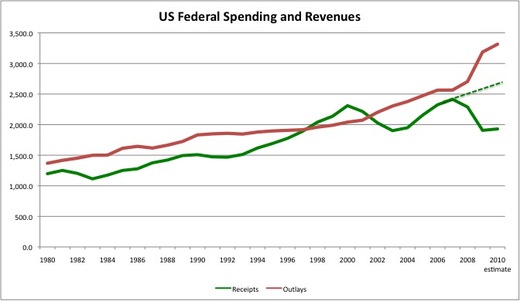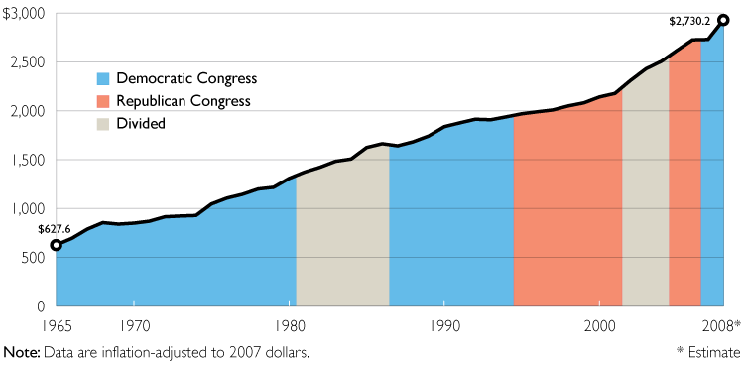There are several good posts on various blogs today and I thought I would summarize some of them. This is sometimes called a “thumbsucker” column when it appears in the NY Times.
1. Germany is rapidly recovering from the financial crisis. This from, of all people, David Brooks.
During the first half of this year, German and American political leaders engaged in an epic debate. American leaders argued that the economic crisis was so bad, governments should borrow billions to stimulate growth. German leaders argued that a little short-term stimulus was sensible, but anything more was near-sighted. What was needed was not more debt, but measures to balance budgets and restore confidence.
The debate got pointed. American economists accused German policy makers of risking a long depression. The German finance minister, Wolfgang Schäuble, countered, “Governments should not become addicted to borrowing as a quick fix to stimulate demand.”
So, the Germans went one way, we went another. Results ?
The American stimulus package was supposed to create a “summer of recovery,” according to Obama administration officials. Job growth was supposed to be surging at up to 500,000 a month. Instead, the U.S. economy is scuffling along.
The German economy, on the other hand, is growing at a sizzling (and obviously unsustainable) 9 percent annual rate. Unemployment in Germany has come down to pre-crisis levels.
In fact, the second quarter US GDP has now been revised DOWN by 1/3. To 1.6% growth.
As an editorial from the superb online think tank e21 reminds us, the Germans have recently reduced labor market regulation, increased wage flexibility and taken strong measures to balance budgets.
2. Victor Davis Hanson writes excellent columns on his web site but the one today is exceptional. “Decline is a choice.”
In the age of Obama, the notion of not being exceptional or preeminent comes as a relief to millions on the left who pretty much are in sync with the protocols of the United Nations. On the right, there is a sense that Obama is the ultimate expression of downfall; given the wild spending, the iconic efforts abroad at apology, and the rampant entitlements we simply aren’t what we once were. In between, most aren’t quite sure—but sure are worried that we may never climb out of our self-created indebtedness crater, and that the culture’s education, the nation’s borders, and the civilization’s values are eroding.
He makes the point that much of our problems are psychological and, in fact, are the consequences of one generation, the Baby Boomers.
On the plus side, as I mentioned last time, our economy is almost three times larger than China’s. American agriculture is the most productive in the world. There is simply nothing like the farmland in the Great Plains, or the 400 miles of irrigated expanse between Bakersfield and Red Bluff. For all the damage done by the federal government, we remain the most orderly free society on the planet, where merit still to a large degree determines success—not class, race, or tribal affiliation. While our universities in the humanities are increasingly corrupt, their science, engineering, and computer science departments, as well as professional schools in business and medicine, are the best in the world. It is not that Cal Tech, MIT, Harvard or Yale or Stanford are better than counterparts in Germany or Russia or China, but that an entire array such as UCLA, USC, Texas, Ohio State, Duke, and dozens of others is as well.
We have huge reserves of both coal and natural gas, and can quite easily quadruple our nuclear power generation. The U.S. military is not just the most technologically advanced and supplied, but the most experienced in all phases of modern challenges, from air campaigns to counter-insurgency.
I have lost confidence in American arts, in the sense of fiction and poetry, which are now in large part warped by the cult of race/class/gender orthodoxy that brings intertribal awards and recognition, but American scholarship in science, medicine, and the professions remains preeminent.
I agree with all this and have had confirmation with my youngest daughter’s experience at the University of Arizona two years ago. I believe, and she suspected, that her experience, at a cost of $25,000 per year, was useless. She has returned home and is starting junior college in San Diego Monday. She told me what her classes are and they all sound solid and useful.
I could go on, but you get the picture: our parents and grandparents left us a wonderful infrastructure, methodology, and constitutional system. So it is hard for our generation (I was born in 1953) to screw things entirely up, although we have done our best, within a mere twenty years of coming into the responsibility of governance.
Look at the often cited pathologies that are destroying what we inherited, and note how easily they are within our material ability to cure—and yet how psychologically we simply lack the courage to take our medicine.
I agree with his comments and there is an interesting thread in the comments section of the blog. There is a growing backlash against the cultural and political “elite,” including the practices of affirmative action. Racism has been taboo for 40 years. We are now learning that American blacks are the final reservoir of this poison and a backlash may come soon if this continues.
3. The election in Alaska is a microcosm of the coming revolt against the elites. The Alaska Republican primary election was won by a tea party and Sarah Palin backed insurgent. The GOP apparatchiks seem to be trying to steal the election for the incumbent, Lisa Murkowski, an example of nepotism if there ever was one. Sarah Palin began her career by defeating Lisa Murkowski’s father in the election for governor. He appointed his daughter to fill a vacant Senate seat. There is just nothing like starting at the top.
A reliable source unaligned with either GOP senatorial campaign in Alaska, and positioned to know, confirmed for me last night that the Alaskan Republican Party (ARP) stepped up their efforts on behalf of Sen. Lisa Murkowski in the closing days of the election, going so far as to phone bank for her from the Alaska GOP’s headquarters on election day.
There is just no better example of trying to thwart the will of the people. Primary elections should be hands-off for the party. Instead the NRSC seems to be heavily involved in trying to pick candidates. If someone were to write a book on how to fuck up a golden chance to elect lots of Republicans, this should be chapter one.
4. John Boehner gave an excellent speech that may suggest an aggressive GOP agenda. I hope so.
I refer you back to my post on Angelo Codevilla’s essay that I posted on recently. It is amazing to see how quickly his points are being proven true. These are frightening times. I took two friends from England on a tour of California three years ago. Rather than waste time at tourist attractions everyone has seen, I drove them through the Central Valley that Hanson refers to. I wanted them to see the real riches of California. Now, that valley is mostly a dust bowl thanks to the Environmental Protection Agency and its concern over a tiny non-native fish in the Sacramento Delta.
This coming election will be the most important for our future since 1860.


